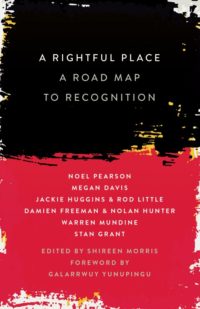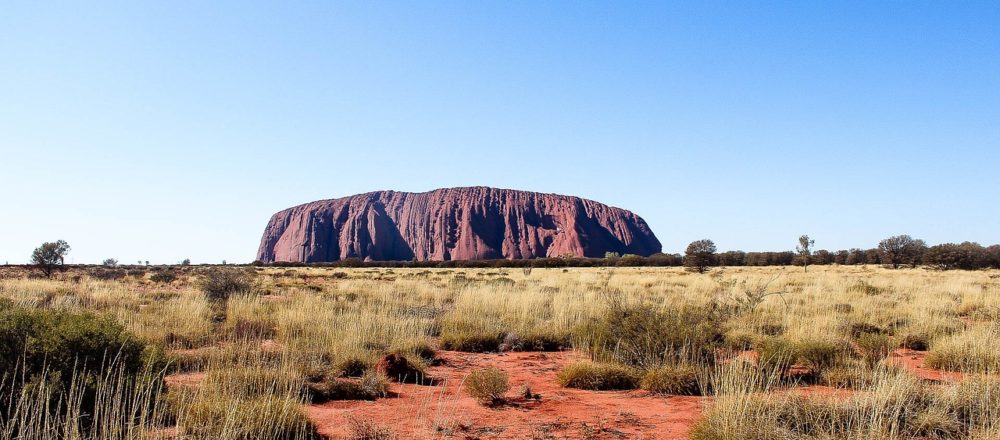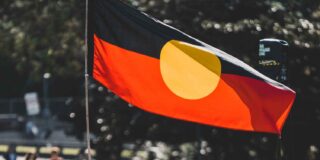A Rightful Place: A Road Map to Recognition
Noel Pearson, Shireen Morris
Black Inc.
 “Here, together, we form a new people bound not by the chains of history but committed to a future together.”
“Here, together, we form a new people bound not by the chains of history but committed to a future together.”
These words, written in the style of the American Declaration of Independence are a mock-up of those that could one day appear as a preamble to our own constitution. Written by Stan Grant, this “Makarrata Declaration” is a text that stresses inclusion for all, and recognition of the heritage of this land. Whilst there is still much progress to be made, a symbolic gesture such as this would be a significant step towards unity.
A Rightful Place: A Road Map to Recognition presents itself at an important juncture in the evolution of Australian identity, as debates rage around the country regarding constitutional change and the future of Australia Day. Indeed, there are few issues today as incendiary as race relations and Indigenous recognition. The anger since the Invasion Day protests have certainly highlighted this. Heated rhetoric from both sides is regularly warped and misconstrued and this has led to mistrust, outrage and fear. This book, however, stands out as a perfect example of a peaceful dialogue, and a useful guide to finding an amicable way forward.
A Rightful Place consists of a series of essays written by prominent Australians, aiming to shed light on the problems facing Indigenous Australians. Despite what many claim, these authors don’t “seek to harm Australia”, rather, they “seek to make a better country for all of us”. The ten authors aim to save Indigenous people, their culture, their heritage, and ultimately, the soul of an Australia that has for too long struggled to reconcile with its ugly past.
A significant and indeed, recurring suggestion contained within A Rightful Place rests on the Uluru Statement from the Heart, which has since been rejected by the Turnbull government. Within this declaration, Indigenous leaders plead for the right to be heard in parliament, to have agency over decisions made about their community, and to be recognised as the rightful owners of the land. In A Rightful Place, some of those present further argue their case and explain their motives.
Noel Pearson argues that such a body would help protect an “extreme minority” within a potentially oppressive democracy, a problem exacerbated by the geographical dissipation of Indigenous communities across Australia. Shireen Morris concurs, arguing that such a body, coupled with constitutional recognition of the First Nations, would prevent further botched policies, such as the Northern Territory intervention. This policy, Morris explains, was poorly implemented due to a lack of consultation with those it sought to help. Rather, had such a policy been the work of a council comprised of members from that community, it may have been better formulated, better accepted and overall, more successful. Yet ultimately, it is not power that the Indigenous community seeks – it is responsibility for their affairs, a responsibility to manage their communities in a way that has been denied to them for far too long.
To have such a power, they argue, could help preserve Indigenous heritage, not just for the Indigenous, but for all Australians to unite in divisive times. As Noel Pearson explains, if we fail to preserve cultural relics such as the “song lines … of central Australia … we would all be poorer for the loss”. Indeed, these songs and stories are “Australia’s Book of Genesis”.
Stan Grant suggests that, through literature and art, the human story can live on after the human life has ended. Within a declaration, similar in tone to that of the Declaration of Independence, the Australian community – inclusive of Indigenous and settler people – can unite and move towards the great nation we are capable of being. This so-called “Makaratta Declaration” would be a fitting recognition of all the people that make up this land, including those who came first and those yet to arrive.
A Rightful Place is an important book, and certainly one that should be considered by all Australians who hope to find a peaceful way forward. In these troubled times, where political divides can feel liable to tear us apart, an empathetic understanding can help unite us. As Shireen Morris notes, “formal inclusion of the First Nations would be a deeply patriotic move, not a divisive one.”



